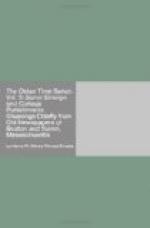It would be easy to multiply cases showing the old methods of dealing with criminals; but we think we have cited enough for our readers to be able to form some judgment as to the desirability of reviving the old and degrading systems, even if it could be done. It does seem sometimes that there are brutes in the shape of men whose cruelty, especially in the case of crimes against women, makes them deserving of the worst punishment that could be inflicted for the protection of society; but for the general run of such comparatively light offences as petty larceny, etc., beating and branding with hot irons must be considered barbarous in the extreme, and more after the manner of savages than Christians. We always thought that the beating of scholars—a practice once very common in schools—for such trifling offences as whispering and looking off the book, was a gross outrage, and the parent knowing and allowing it was in our opinion as guilty as the schoolmaster. Of course we will not deny that teachers did, then as now, have a great deal to put up with from saucy, “good-for-nothing” boys, to whom the rod could not well be spared; but we do not allude to such cases. We knew a master whose delight, apparently, was pounding and beating little boys,—he did not touch the large ones. And yet he was generally considered a first-rate teacher. Parents upheld him in anything he chose to do with the boys, and if they complained at home, they were told that it must have been their fault to be punished at all. This man every morning took the Bible in one hand and his rattan in the other and walked backward and forward on the floor in front of the desks while the boys read aloud, each boy reading two or three verses; and woe be to any boy who made a mistake, such as mispronouncing a word! Although he might never have been instructed as to its pronunciation, he was at once pounded on the head or rapped over the knuckles. Of course he never forgot that particular word. And this teacher was called only “strict”! If ever a man deserved the pillory, it was that teacher.
Possibly some of our readers may think that there is another side to this story; for the benefit of such we give some lines from the “Salem Gazette,” Feb. 6, 1824.
From the Connecticut Centinel.
THE SCHOOLMASTER’S SOLILOQUY.
To whip, or not
to whip?—that is the question.
Whether ’tis easier
in the mind to suffer
The deaf’ning clamor
of some fifty urchins,
Or take birch and ferule ’gainst
the rebels,
And by opposing end it?
To whip—to flog—
Each day, and by a whip to
say we end
The whispering, shuffling,
and ceaseless buzzing
Which a school is heir to—’tis
a consummation
Devoutly to be wished.
To whip, to flog,
To whip, and not reform—aye,
there’s the rub.
For by severity what ills
may come,
When we’ve dismissed




